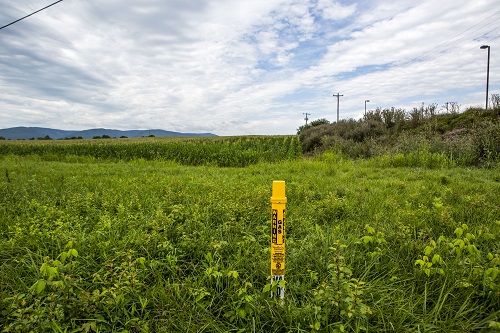U.S., Dominion Energy Ask Supreme Court to Hear Atlantic Coast Pipeline Case
(Reuters) - The U.S. Solicitor General and Dominion Energy Inc asked the Supreme Court to hear an appeal of a decision that stopped Dominion from building the Atlantic Coast natural gas pipeline across the Appalachian Trail in Virginia.
Solicitor General Noel Francisco and Dominion argued in their filings on Tuesday that the Richmond, Virginia-based 4th U.S. Circuit Court of Appeals decision in the Cowpasture v. U.S. Forest Service case impedes energy infrastructure development on the East Coast.
In December, the appeals court vacated a permit that allowed the Atlantic Coast pipe to cross the Appalachian Trail on National Forest land because the court said the Forest Service lacks authority to grant pipeline rights-of-way across the trail on federal land.
Dominion said the decision could turn the Appalachian Trail into a 2,200-mile (3,541-kilometer) barrier separating resource-rich areas to its west from consumers to its east. The company noted there were already approximately 56 pipelines across the Appalachian Trail.
Some energy analysts think there is a good chance the Supreme Court will hear the case and have warned Dominion may cancel the project if the court refuses to hear it.
"After reading the Solicitor General's arguments, we're increasing our odds to just under 50% that the Supreme Court decides to hear the case," Josh Price, senior analyst at Height Capital Markets in Washington said in a note on Wednesday.
"We believe the Court may view this as an issue of national importance," Price said, noting "if the court declines to take up the case or upholds the ruling, we anticipate (Atlantic Coast) owners may cancel the projects."
Dominion, however, said it plans to complete the project and believes it has a good chance of getting the Supreme Court to hear the case and support its view.
Dominion has said it hopes to overcome other legal challenges that will allow it to resume construction of the $7.0-$7.5 billion pipeline later this year and complete it in 2021.
Dominion suspended construction in early December after the Fourth Circuit in another case stayed a U.S. Fish and Wildlife Service permit that authorized Dominion to build the pipe in areas inhabited by threatened or endangered species.
When Dominion started work on the 600-mile pipe from West Virginia to North Carolina in the spring of 2018, the company estimated it would cost $6.0-$6.5 billion and be completed in late 2019.
Related News
Related News

- Kinder Morgan Proposes 290-Mile Gas Pipeline Expansion Spanning Three States
- Enbridge Plans 86-Mile Pipeline Expansion, Bringing 850 Workers to Northern B.C.
- Intensity, Rainbow Energy to Build 344-Mile Gas Pipeline Across North Dakota
- U.S. Moves to Block Enterprise Products’ Exports to China Over Security Risk
- Court Ruling Allows MVP’s $500 Million Southgate Pipeline Extension to Proceed
- U.S. Pipeline Expansion to Add 99 Bcf/d, Mostly for LNG Export, Report Finds
- A Systematic Approach To Ensuring Pipeline Integrity
- 275-Mile Texas-to-Oklahoma Gas Pipeline Enters Open Season
- LNG Canada Start-Up Fails to Lift Gas Prices Amid Supply Glut
- TC Energy’s North Baja Pipeline Expansion Brings Mexico Closer to LNG Exports





Comments